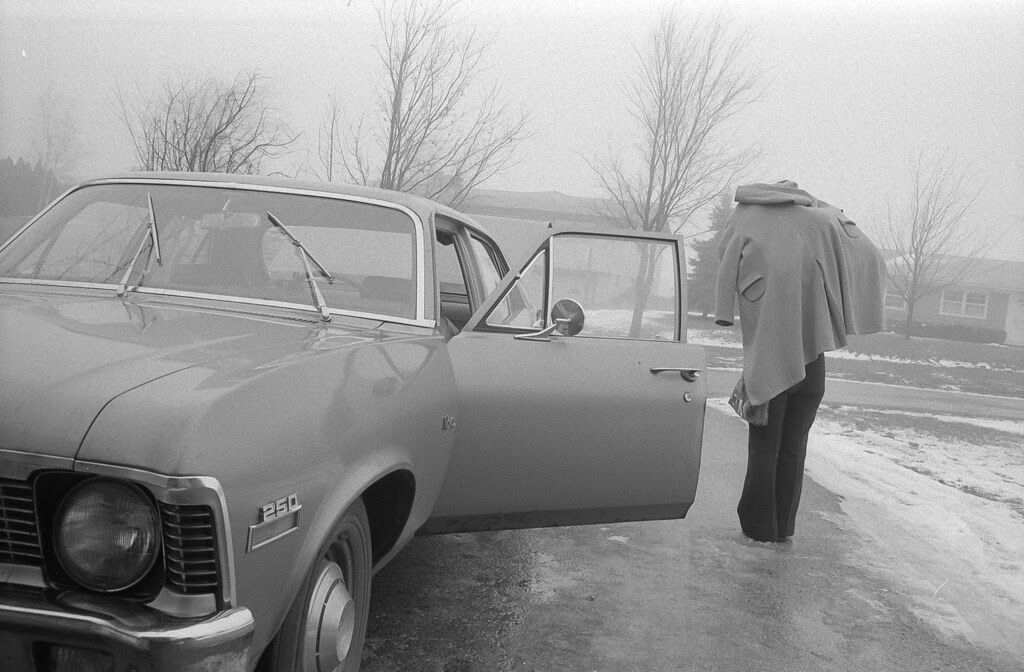.

Snow storm, Roland Park, Baltimore: photo by Chuck Patch, 27 January 2011
covering over
all the colour
all the colour
in the world
with white
and gray
and gray
but for a little
yellow patch
exposed tissue
exposed tissue
where a limb
has torn
away and left
tender life
vulnerable
and open
to the cold

Northwest side, Chicago: photo by Chuck Patch, 27 June 1973, posted 2014

Nova, winter, Madison, Wisconsin: photo by Chuck Patch, 1974, posted 2014

Winter, Lake Mendota, Madison, Wisconsin: photo by Chuck Patch, 1973, posted 2014



6 comments:
What a lovely poem for the bleak, wintry-white passage toward the wolf hour. Thank you, Tom!
There is that line that John Cage quotes from Ananda K. Coomaraswamy saying that art should imitate nature in its manner of operation. I think Exposed really does this; that’s how it feels to me. The tall slim trunk of the poem and the way the Chuck Patch photos span a generation of time, all of which remind me very acutely and specifically of things I’ve seen and felt in places like those. All the photos are wonderful to spend time with (even Chicago in June looks wet and cold), but the top one is a real beauty and the sight of the exposed flesh where the branch has separated and the bark torn away is really affecting. They said it was going to get warmer, but it hasn’t yet. We’re in water main rupture season here and I’ve postponed a journey north for two days because it seems more logical (and a lot more comfortable) to hunker down here. The top photo caused me to research the history of Roland Park in Baltimore, something I never would have thought of doing otherwise, and it was a rewarding journey. Happy Chinese New Year from the Philadelphia suburbs. Curtis
Yes, I love this, and it looks just like my walk in the woods lately. That yellow patch included. I had to wear ski goggles last week because the eyeballs were hurting in the wind. But there's always that one spot . . .
Thanks all, and yes, Chicago sometimes has a way of looking cold even in June -- and those overhead trolley lines (now long gone, beyond present memory of all but the ancient) seem like an etch-a-sketch version of the Roland Park snow storm trees.
Curtis and Nin as civilized bright-and-early people may be unaware of the mysteries that only the Shadow Knows, but Red definitely has an inkling.
For sad to tell, things around here have indeed locked into that long winter loop, and it's the Hour of the Wolf at whatever-o-clock.
Sleep problems, end of story... and beginning of the end.
(Anybody who wants to know how the party turns out may get a bleary eyeful here and
here.)
But Chuck Patch -- now there's a waking eye.
Very tender poem.
The history of the word almost excludes everything but what is young and fresh and green from its gentle umbrella of connotation; and it seems only appropriate that the sensitivity of new life should be thus gently protected; for the old and frail, there is always the problem of forgetting that what does appear young and robust may well be as tender as what does not... or more so.
"Soft, easily injured," early 13c., from Old French tendre "soft, delicate; young" (11c.), from Latin tenerem (nominative tener) "soft, delicate; of tender age, youthful," from a derivative of PIE root *ten- "stretch" (see tenet), on the notion of "stretched," hence "thin," hence "weak" or "young." Cf. Sanskrit tarunah "young, tender," Greek teren "tender, delicate," Armenian t'arm "young, fresh, green."
Meaning "kind, affectionate, loving" first recorded early 14c. Meaning "having the delicacy of youth, immature" is attested in English from early 14c. Related: Tenderly; tenderness. Tender-hearted first recorded 1530s.
Post a Comment